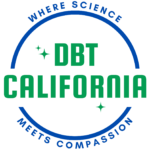What is DBT for adults? DBT targets the issues that cause distress and teaches clients new skills to deal with these problems in a new way; without self-harm, suicidal thoughts, or other problematic coping strategies. DBT for adults strategically blends behavior therapy (change orientation) with validation (acceptance orientation). Dialectical Behavior Therapy (DBT) is proven in clinical research to help people with the following problems:
- Borderline Personality Disorder
- Suicidal Adolescents
- Substance abuse/Impulsive behaviors (i.e., shoplifting, high risk sex, etc.)
- Suicidal Behavior/Self-Injurious Behavior
- Intense emotions (i.e. anger, sadness, fear)
- Difficulty building and maintaining healthy relationships
- Chronic feelings of emptiness
- Depression among older adults
DBT for adults also is better than standard treatments for BPD at keeping people out of the emergency room and the hospital. In fact, DBT is the most well-established psychological treatment for problems related to BPD. DBT balances acceptance and change. Cognitive Behavioral change strategies are blended with Eastern practices including mindfulness and meditation. Comprehensive DBT for adults is available in all three of our locations (Long Beach, Beverly Hills, and Newport Beach).
DBT California’s Comprehensive DBT Program
Being a participant in DBT California’s comprehensive DBT for adults program involves:
Enhanced DBT Programs
DBT-PE
Recent empirical studies have demonstrated that it is not necessary to wait to engage in trauma treatment until after you have completed Stage 1 DBT treatment. Studies have shown that individuals can show significant progress in DBT and Prolonged Exposure (PE) for treatment of emotion dysregulation and trauma symptoms at the same time, without causing increases in suicide or self-injury urges.
In order to provide state of the art treatment, CBTC therapists can utilize the option of PE treatment within the standard DBT frame. To minimize risk, PE is an option with concurrent DBT when individuals are no longer at imminent risk of suicide, have not engaged in life threatening behaviors for at least 30 days, are able to exhibit behavioral control over life-threatening urges and behaviors (even when cues to these behaviors are present). In addition, PE is an option to those individuals who want to treat trauma symptoms more immediately and who are willing to experience emotions associated with trauma without doing deleterious things to escape these emotional experiences.
DBT-ACES
DBT ACES (Acceptance the Challenges of Exiting the System) is a treatment implemented after the completion of standard DBT, adapted and expanded by Kate Comtois, Ph.D. at Harborview Mental Health Service. The goal of DBT-ACES is to help clients achieve effective and satisfying employment, financial independence, social belonging, and self-sufficiency. In addition, treatment works to reduce the need for financial and other practical supports from the government, employer disability programs, or family/friends. The focus in DBT-ACES is on overcoming anxiety, avoidance, and other emotional problems that interfere with obtaining and maintaining employment, a social network, building your life worth living, and achieving your grand ambition. A more nuanced approach, DBT-ACES teaches more complex versions and advanced application of standard DBT skills. Other skills such as goal-setting, problem-solving, time management, and flexible effective thinking are also emphasized. DBT-ACES requires clients to spend considerable time on career/life goal development activities including working, attending college or other strategies to achieve gainful employment or a fulfilled life.
DBT-SUD (Substance Use Disorders)
DBT-SUD is a modification of standard DBT, for those who have co-occurring mental health and substance abuse problems. Research has supported the efficacy of DBT for substance use disorders. Among the goals of DBT-SUD are to: become more aware of urges to drink or use and tolerate urges without acting on them; increase motivation to stop abusing alcohol or drugs; manage strong negative emotions such as fear, sadness, and anger without alcohol or drugs; and make changes in the environment to support substance-free living.
Participants learn to utilize DBT skills to effectively cope with strong negative emotions, as well as build towards their life worth living. Individual therapy, group therapy, and as-needed phone coaching is provided by clinicians trained in DBT and substance use treatment. Although a harm reduction model informs the treatment, participants strive for dialectical abstinence, being 100 percent clean and sober. Drug testing is available as a treatment option if clinically indicated.
Friends and Family
At DBT California, we are aware of the difficulties of having a loved one with emotional and behavioral difficulties. While many of these people are often described as “difficult” or “manipulative,” the DBT California team perceives them differently and understands the core of their emotional struggles. Our Friends and Family program is designed to help the friends and family members of individuals with medical and behavioral problems learn skills to cope better with the chaos that can accompany these problems. Our Friends and Family Program utilizes the Family Guidelines, published by the New England Personality Disorder Association, to teach friends and families to:
- Set realistic expectations
- Manage the family environment
- Manage crises effectively
- Address problems with communication
- Observe limits
DBT California’s Friends and Family program curriculum covers the following topics:
- Education on Emotional Regulation and DBT
- Family Perspectives and Experiences
- Mindfulness Skills
- Emotion Regulation Skills
- Effective Communication Skills
- Distress Tolerance Skills
- Validation Skills
Our Friends and Family program is offered at our Long Beach, Beverly Hills, and Newport Beach locations.
